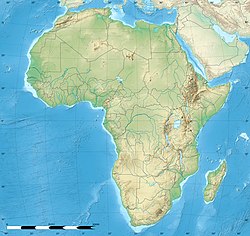
Back سيكوندي تاكورادي Arabic سکوندی-تاکورادی AZB Секанды-Такарады BE Секонди Такоради Bulgarian Sekondi-Takoradi Catalan Takoradi (lungsod sa Ghana) CEB Sekondi-Takoradi Czech Sekondi-Takoradi Danish Sekondi-Takoradi DAG Sekondi-Takoradi German
Sekondi-Takoradi | |
|---|---|
 Top left picture: Arterial road and highway with the Sekondi-Takoradi Stadium, First top right picture: Shoreline of Sekondi-Takoradi, Second top right picture: Railway station of Sekondi-Takoradi, Bottom picture: Sekondi-Takoradi harbour with intermodal containers and private housing estates. | |
| Etymology: Old Prussian: Secundis ("Second"), Takoradi (combination of "taccarada" or "Taccarary" and "ntakor") | |
| Nickname: Oil City | |
Location of Sekondi-Takoradi in Western Region, Ghana | |
| Coordinates: 04°55′00″N 01°46′00″W / 4.91667°N 1.76667°W | |
| Country | |
| Region | Western Region |
| District | Sekondi Takoradi Metropolitan |
| Merged | 1946 |
| Government | |
| • Type | Mayor-Council |
| • Municipal chief | Hon. Abdul-Mumin Issah |
| Elevation | 10 m (30 ft) |
| Population | |
• Total | 104,847 |
| • Ethnicities | |
| • Religions |
|
| Time zone | UTC+0 (GMT) |
| Postal codes | WS000-WS792 |
| Area code | 031 |
| Climate | Aw |
| Website | stma.gov.gh |
Sekondi-Takoradi (/səˈkənˈdɪ tɑːˈkəˈrɑːˈdi/ seh-kon-DEE tar-ku-wh-DEE)[4] is a city in Ghana comprising the twin cities of Sekondi and Takoradi.[5]: 4 [6] It is the capital of Sekondi-Takoradi Metropolitan District and the Western Region of Ghana.[3]: 2 Sekondi-Takoradi is the region's largest city as well as an industrial and commercial center with a population of 245,382 people, according to the 2021 census.[2][7] Since 2021 the mayor of the city and the metropolitan area has been Abdul-Mumin Issah.[1] Kwabena Okyere Darko-Mensah is the current member of parliament for Takoradi.[8]
Both cities grew from Dutch and English forts built around the 17th century.[5]: 2 After a railway and a deepwater seaport was built in Sekondi and Takoradi in 1903 and 1928, both cities became important economic sectors in Ghana. They merged in 1946.[5]: 6, 8, 4
Leading industries in the city are timber, cocoa processing, plywood, shipbuilding, its harbour and railway repair, and recently, sweet crude oil and crude oil. The most common occupation in Sekondi-Takoradi is fishing.[9] Sekondi-Takoradi lies on the main railway lines to Kumasi.[3][10][5]
- ^ a b "STMA Confirmed The President's Nominee Hon. Abdul-Mumin Issah as the Mayor Sekondi Takoradi". Sekondi Takoradi Metropolitan. 15 October 2021. Retrieved 31 August 2024.
- ^ a b Population of Regions and Districts Report (2021) (PDF) (Report). Ghana Statistical Service. p. 52. Retrieved 12 July 2024.
- ^ a b c 2010 housing & population census (Sekondi-Takoradi Metropolitan) (PDF) (Report). Ghana Statistical Service. Retrieved 10 July 2024.
- ^ "Sekondi-Takoradi". Merriam-webster. Retrieved 10 July 2024.
- ^ a b c d Obeng-Odoom, F. (2012). "Political economic origins of Sekondi-Takoradi, West Africa's new oil city". Urbani Izziv. 23 (2): 121–130. doi:10.5379/urbani-izziv-en-2012-23-02-005. JSTOR 24920828.
- ^ Annim, A. (4 February 2022). "Twin-Cities project to plant 5,000 fruit-trees in Sekondi-Takoradi". Citinewsroom. Retrieved 22 July 2023.
- ^ "Sekondi Takoradi Metropolitan (Metropolitan District, Ghana) - Population Statistics, Charts, Map and Location". www.citypopulation.de. Retrieved 9 November 2024.
- ^ "Parliament of Ghana". www.parliament.gh. Retrieved 19 November 2024.
- ^ "Sekondi-Takoradi". Infoplease. Retrieved 8 February 2014.
- ^ "Ministry of Railways Development - Ghana - railways development construction on western and eastern lines speeds off steadily". Ministry of Railway Development, Ghana. 19 August 2018. Retrieved 22 July 2023.

